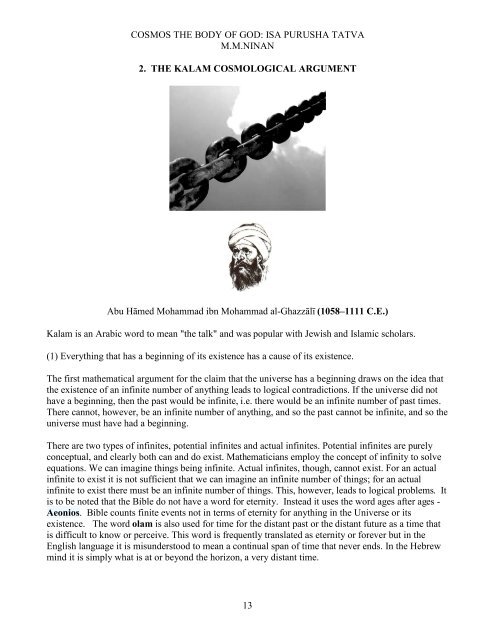You also want an ePaper? Increase the reach of your titles
YUMPU automatically turns print PDFs into web optimized ePapers that Google loves.
COSMOS THE BODY OF GOD: ISA PURUSHA TATVA<br />
M.M.NINAN<br />
2. THE KALAM COSMOLOGICAL ARGUMENT<br />
Abu Hāmed Mohammad ibn Mohammad al-Ghazzālī (1058–1111 C.E.)<br />
Kalam is an Arabic word to mean "the talk" and was popular with Jewish and Islamic scholars.<br />
(1) Everything that has a beginning <strong>of</strong> its existence has a cause <strong>of</strong> its existence.<br />
The first mathematical argument for the claim that the universe has a beginning draws on the idea that<br />
the existence <strong>of</strong> an infinite number <strong>of</strong> anything leads to logical contradictions. If the universe did not<br />
have a beginning, then the past would be infinite, i.e. there would be an infinite number <strong>of</strong> past times.<br />
There cannot, however, be an infinite number <strong>of</strong> anything, and so the past cannot be infinite, and so the<br />
universe must have had a beginning.<br />
There are two types <strong>of</strong> infinites, potential infinites and actual infinites. Potential infinites are purely<br />
conceptual, and clearly both can and do exist. Mathematicians employ the concept <strong>of</strong> infinity to solve<br />
equations. We can imagine things being infinite. Actual infinites, though, cannot exist. For an actual<br />
infinite to exist it is not sufficient that we can imagine an infinite number <strong>of</strong> things; for an actual<br />
infinite to exist there must be an infinite number <strong>of</strong> things. This, however, leads to logical problems. It<br />
is to be noted that the Bible do not have a word for eternity. Instead it uses the word ages after ages -<br />
Aeonios. Bible counts finite events not in terms <strong>of</strong> eternity for anything in the Universe or its<br />
existence. The word olam is also used for time for the distant past or the distant future as a time that<br />
is difficult to know or perceive. This word is frequently translated as eternity or forever but in the<br />
English language it is misunderstood to mean a continual span <strong>of</strong> time that never ends. In the Hebrew<br />
mind it is simply what is at or beyond the horizon, a very distant time.<br />
13


















